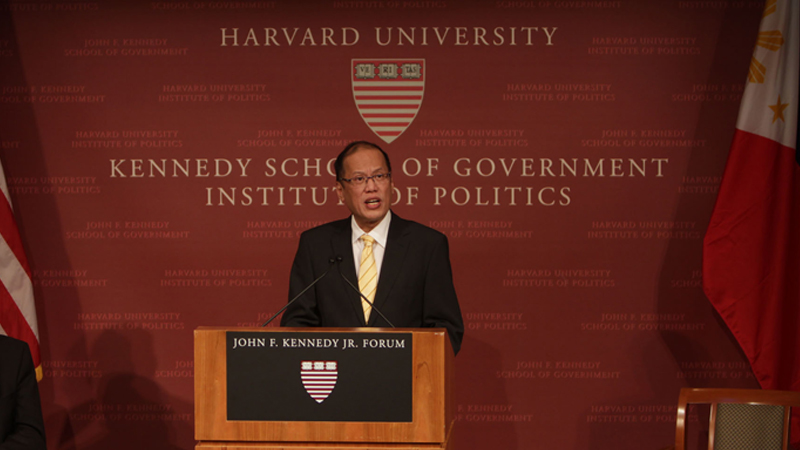Aquino at Harvard: I am chasing my father’s ‘impossible’ dream

President Benigno S. Aquino III delivers his policy speech at Kennedy School of Government, Harvard University, during the John F. Kennedy Jr. Forum. EDWIN BACASMAS
CAMBRIDGE, Massachusetts—President Aquino on Monday told a forum at Harvard University’s John F. Kennedy School of Government that he had committed himself to fulfilling the dreams of his father, the late Sen. Benigno Aquino Jr.
“I have to do whatever I can to be able to finish that dream and to make the sacrifice have some meaning,” Aquino said to the audience that included teachers, students and members of the Filipino-American community on his sentimental journey to his old home in Boston.
“John F. Kennedy dreamed bigger, and acted on it. My father laid down his life, and in so doing, ignited a movement that toppled a dictatorship. My mother devoted her life to ensuring that the democracy we had reclaimed would never again be taken away. All of them were faced with daunting tasks, and all of them dared, risked and acted,” Aquino said.
‘Why not?’
“This is my message to all of you: Like JFK, Ninoy and Cory, each one has the capacity to dream, to die, to live, to fight, to stand for something, to ask ‘Why not?’ when the challenges seem insurmountable. Thus can we transform the world for the better.”
Aquino arrived in Boston on Saturday night from Berlin following a weeklong visit to Spain, Belgium, France and Germany to drum up support for the Philippines’ move to bring its territorial dispute with China to international arbitration and invite investors to the country. He flies tonight to New York to join a United Nations summit on climate change.
The elder Aquino, jailed by President Ferdinand Marcos for nearly eight years, was assassinated on Aug. 21, 1983, on his return to Manila, from three years of self-exile in the United States with his family.
The President said his father, as an opposition senator in the premartial law years, was “perhaps the fiercest fiscalizer of Mr. Marcos, in conformity with the concept of checks and balances in government.”
By sheer irony, Aquino began his official working visit in Boston on Sept. 21, the 42nd anniversary of Marcos’ declaration of martial law.
As he was only 23 years old when his father was killed, the President remarked that he could have said “they’re (Filipinos) probably not worth fighting for, not worth living for, [for] they allowed this tragedy to happen to my dad.”
But despite the assassination, “there really seems to be that plan that will prepare you for the next step, that will help you overcome it,” Aquino said.
When his mother, former President Cory Aquino, died in 2009, there was a clamor that the Aquinos’ only son seek the presidency after the nine-year administration of then President Gloria Macapagal-Arroyo, which was tainted with allegations of massive corruption.
He said in his policy speech that starting in 2001, Arroyo “instead of learning the lessons of martial law, seemingly adopted Mr. Marcos’ handbook of how to abuse the democratic process.”
“At the end of her regime, our people were so apathetic to all the scandals and issues affecting her, and government’s inability to effect change, that the overwhelming ambition of so many was to leave the country. Now, an estimated 10 million of our countrymen reside abroad,” Aquino said.
When he assumed the presidency in 2010, Aquino said that he wanted to eliminate corruption to eliminate poverty.
Freedom from hunger
This echoed the lesson he learned from his father who had told him that the “most basic freedom is the freedom from hunger, and until that is resolved everything else becomes irrelevant.”
Aquino said his administration’s efforts to reform a “broken-down government that Filipinos had once accepted as the norm,” had led to an “effective and efficient government working to uplift the country.”
He gave as an example four case studies that “illustrate the adherence to our bedrock principles of integrity, inclusiveness and justice based on the rule of law.”
4 case studies
The first was about a young girl of 16 whom he met on the campaign trail, pregnant with her second child. To Aquino, she represented the problem of government’s failure to empower its people, considered a nation’s most valuable resource.
Thus, his administration stepped up programs that would invest in “the wellbeing of the people” to ensure that “no one will be left behind.”
The second case involved the impeachment trial and conviction of Chief Justice Renato Corona, which the President said, showed the need for public officials to be held accountable for their wrongdoing.
Third was his secret meeting with Moro Islamic Liberation Front chair Murad Ebrahim in 2011 that paved the way to a peace agreement with the secessionist group.
And fourth was seeking a peaceful resolution to the territorial dispute with China.
Aquino stressed that to have prosperity, there needed to be “peace and stability within our own borders and in our part of the world.”
Transformation
The President said the “transformation” of the Philippines happened because his administration refused to give up on the reforms it sought and chose to change the status quo instead of settling for or enduring it.
“Today, even the political opposition grants that we have made tremendous progress, which the Filipino people, of course, have seen for themselves,” he said.
Despite criticisms, Aquino said he would not give up because it would mean “allowing the shameless and the unscrupulous to have free reign over the fate of everyone else.”
“My administration’s mandate lasts six years, and I am determined to make the most of it. Our challenge today is to make the gains even greater, and to ensure that the transformation becomes an enduring mainstream of justice and inclusiveness,” he said.
The President expressed hope that the Philippines’ experiences would motivate those in the audience to be “influencers” that would inspire other communities and institutions.